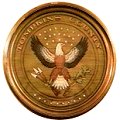- By Marcia E. Lynch
- News
 Print
Print  As the first step in the process of developing the 2014 County budget, the Legislature has approved a 2014 financial goal that directs the County Administrator Joe Mareane to prepare a recommended budget, including critical needs that he may identify, that could be supported with a tax levy increase of no more than 4%.
As the first step in the process of developing the 2014 County budget, the Legislature has approved a 2014 financial goal that directs the County Administrator Joe Mareane to prepare a recommended budget, including critical needs that he may identify, that could be supported with a tax levy increase of no more than 4%.The final vote was 10-4, with Legislators Pat Pryor, Mike Lane, Brian Robison, and Dave McKenna voting no and Legislator Nathan Shinagawa excused. In language added by Legislator Dooley Kiefer, the measure notes that, although based on what is known at this time, a tax levy increase of 4.5% would be justifiable, it is the desire of the Legislature to review a budget that can be supported with a levy increase of no more than 4%.
Legislators directed the Administrator to establish departmental and agency spending targets that can be supported with a 3.5% tax levy increase—about $200,000 less than maintenance-of-effort for the operating budget. That increase would also support the Legislature’s commitment to invest in already approved physical infrastructure improvements as part of the County’s 20 Year Capital Plan. In approving the Capital Plan late last year, the Legislature committed to devote .75% of the levy to support the 2014 capital program. Administrator Mareane projects that another $200,000 (or .5%) needed to address critical County needs, such as funding to support the County Library and Tompkins County Area Development.
Expressing concern about a lack of flexibility to meet needs that could arise during the budget process, Legislator Carol Chock proposed raising the upper limit of the goal to 4.5%, a proposal that failed by a 5-9 margin. Legislators Pryor, Lane, and Robison all expressed the view that the 4% goal is too high, Pryor saying she is mindful of the effect on taxpayers, especially because of the combined burden of property and school taxes. She maintained that her experience with the budget process shows that a 4% goal now shows that the Legislature is actually indicating that it could live with a much higher increase later. Budget chair Jim Dennis responded he would make every effort to make sure that doesn’t happen. Legislator Leslyn McBean-Clairborne said she is also concerned about the effects on people who face services being taken away year after year.
In a separate action, the Legislature also established the guidelines and fiscal targets for County departments and agencies, approved by a vote of 12-1, with Legislator Pryor voting no and Legislators Shinagawa and McBean-Clairborne excused. The action sets the fiscal targets for not-for-profit agencies at the amount approved in the adopted 2013 budget. For county departments, the target equals the 2013 budget target plus negotiated salary increases and associated fringe expense, minus a local departmental reduction of .5%. The departments’ fiscal targets do not include any prior one-time funding nor any funds re-appropriated from previous years. The Legislature authorizes the County Administrator to reduce department targets as needed to achieve the tax levy goal set by the Legislature.
Also related to the 2014 budget process, the Legislature scheduled a public hearing for its next meeting to seek citizen comment on a proposed Local Law that would leave open the option of the County’s overriding the State’s property tax cap for 2014, should that become necessary. The vote was 10-3, with Legislators Pam Mackesey, Peter Stein and Kathy Luz Herrera voting no, and Legislators Shinagawa and McBean-Clairborne excused. The hearing will be held June 4 at 5:30 p.m. at Legislative Chambers of the County Courthouse, 320 N. Tioga Street, Ithaca Legislator Luz Herrera was one who said she sees no need to schedule the hearing this early in the budget process. Language was added noting that information from New York State regarding the County’s 2014 tax cap will not be available until late summer, and the State could penalize the County if its calculations were off and it had not passed a resolution permitting it to exceed the tax cap, if necessary. Administrator Joe Mareane advised that very preliminary calculations indicate the 2014 cap might be somewhere in the neighborhood of 2.5%.
v9i20



